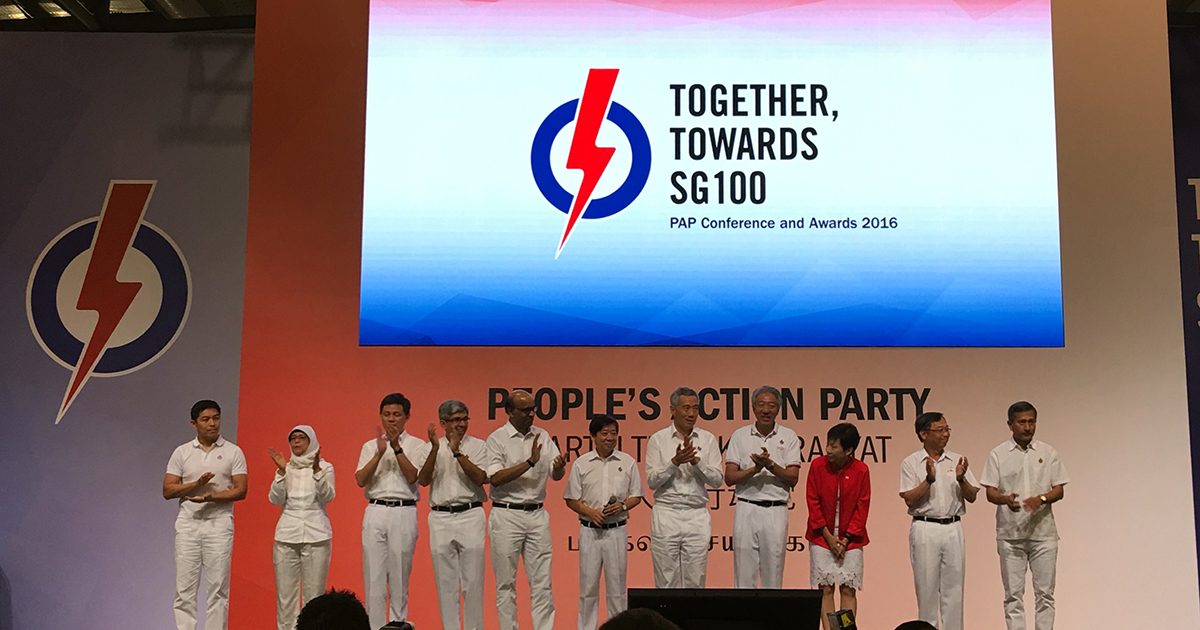The People's Action Party (PAP) cadres, roughly 2,000 most trusted members of the ruling party, is a conservative bunch.
When given the choice to select their top candidates out of the 17 nominees for the bi-annual central executive committee (CEC) election, they opted for their most experienced leaders instead.
The 14-member CEC list, announced at PAP's 34th party conference, are as follows, but not in order of highest votes:
1. Lee Hsien Loong, Secretary-general
2. Khaw Boon Wan, Chairman
3. Yaacob Ibrahim, Vice Chairman
4. Teo Chee Hean, First assistant secretary-general
5. Tharman Shanmugaratnam, Second assistant secretary-general
6. Lim Swee Say, Treasurer
7. K Shanmugam, Assistant treasurer
8. Chan Chun Sing, Organising secretary
9. Gan Kim Yong, Organising secretary
10. Grace Fu
11. Heng Swee Keat
12. Halimah Yacob
Co-opted members
13. Vivian Balakrishnan
14. Tan Chuan-Jin
According to The Straits Times, the three other nominees not in the top 14 are National Development Minister Lawrence Wong, and Education Ministers Ong Ye Kung and Ng Chee Meng.
Timing may have played a part in popularity of Heng Swee Keat, Chan Chun Sing and Tan Chuan-Jin among the cadres
As one wise statesman said, "...the essential ingredient of politics is timing".
After the watershed General Election in 2011, PAP experienced the resignations of two Secretary-Generals in October 2011 -- Lee Kuan Yew and Goh Chok Tong -- together with four other Ministers from the CEC. They included Ministers Lim Boon Heng, Wong Kan Seng, George Yeo and Lim Hwee Hua.
With the six vacancies, newly appointed officer holders Heng, Chan, and Tan were able to be elected and co-opted into the CEC in their maiden CEC election.
On the other hand, there was no retirement among the third generation leaders following GE2015. Hence, Wong, Ong and Ng had to compete with party leaders who had been in the CEC for a few terms.
Even new CEC members and fourth generation leaders like Heng, Chan and Tan had been in the CEC since 2012.
Party leadership renewal has to be conducted with the PAP cadres, for the PAP cadres and for Singapore
As PAP Sec-Gen Lee Hsien Loong said in his speech at the conference on Sunday, Dec. 4, "the PAP must stay a strong, national party".
He mentioned that "we must not only have a capable PAP team for today, but a deep bench, as we build a team for the future".
He added that PAP has “strengthened the next leadership team in the last two GEs” and he hoped that “more will be elected into the CEC” this time.
But it appears that the push for leadership renewal during this CEC has been rather mild -- with the inclusion of two first-term Ministers (Ong and Ng) in the CEC ballot and the easing out of Defence Minister Ng Eng Hen.
Anyway, the PAP is also expected to co-opt up to four more members into the CEC in the coming weeks, so this will be an opportunity to include the younger Ministers.
But with the failure of the three new Ministers to be elected in the CEC on their own, the PAP CEC leadership has to be even more pro-active in pushing for leadership renewal within the party.
After all, the next GE will occur before 2020, and PAP has only one more CEC election left, in 2018.
This means that PAP leaders have to engineer the self-renewal among the Ministers and MPs, even if the cadres are taking a while longer to take to their new leaders.
An option is for the top PAP leaders to persuade the third generation Ministers to consider stepping down from the CEC earlier than later.
Otherwise, it will be a strange situation optically if three out of the six potential PMs are not in PAP's top decision making body but were asked to anchor Group Representation Constituencies (GRCs) in the next GE.
[related_story]
Related articles:
Vivian Balakrishnan replaces Ng Eng Hen in PAP’s top decision-making body
Everything you need to know about PAP's first 'annual report' after GE 2015
If you like what you read, follow us on Facebook, Instagram, Twitter and Telegram to get the latest updates.
